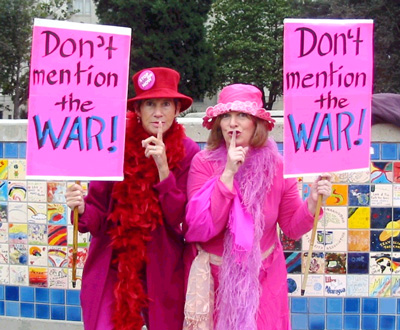How to Support Our Troops on Veteran's Day | ||
By Medea Benjamin and Gayle Brandeis
We see them every day on the back windows of SUVs, the fuel doors of sedans—stickers and magnets that say "Support Our Troops." Sometimes they sport yellow ribbons; sometimes they sport American flags. Often they are weathered, starting to peel off the metal or glass. We see them so often, we tune them out. We hear the words the way we hear "Have a nice day"—a pleasant sentiment that skims over our ears and disappears into the air. Today, on Veteran's Day, when we honor all of those who have served our country through the military, we need to take a closer look at these three words that have become so familiar: What does it mean to truly support our troops? It seems that often when people ask us to support our troops, they are asking us to support our administration's decisions in Iraq. But is our administration supporting our troops by sending them into a war based on lies? Is our administration supporting our troops by sending them into one battle after another with inadequate body armor, inadequately armored vehicles? Is our administration supporting our troops by bringing home the wounded in the dead of night so we can pretend they don't exist? Is our administration supporting our troops by cutting veteran's benefits upon their return, so they have to struggle to pay for their housing, their groceries, their medical care? Is our administration supporting our troops by making them fight an unwinnable war, a war that no longer has the backing of the American public? Peace groups, including CODEPINK and Veterans for Peace, have been staging a weekly candlelight vigil in front of Walter Reed Hospital in Washington, DC since March of this year to highlight the needs of injured soldiers. The vigilers hold signs with slogans such as "Real Support=Better Benefits," "Support Them Once They're Home" and “Fund the Vets, Not the War.” Lately, the vigils have been met by aggressive “counter demonstrators,” who line up on the opposite side of the street with signs denouncing the vigilers. They support the war in Iraq and argue that vigils outside the hospital are demoralizing to the recovering soldiers. But how demoralizing must it be for soldiers coming home to discover that in state after state, VA hospitals are being shut down? How demoralizing must it be for injured soldiers to have to fight for disability benefits, to be faced with increased co-payments, to be told that their PTSD condition is not war-related? And for the soldiers still in Iraq, how demoralizing must it be to learn that the Bush administration manipulated the intelligence about weapons of mass destruction in order to justify an invasion? How demoralizing must it be to learn that the Iraqis don't want us there? How demoralizing must it be to realize that their acts of bravery in Iraq are not making their families safer at home? How demoralizing must it be to see their buddies die in a war that more and more soldiers don't even believe in? Over 2000 of our troops have been killed, and over 15,000 injured. These numbers are important to remember, but it is also important to remember that our troops are not numbers, not statistics. They are flesh and blood human beings, and there are actions we can take to support them that are much more meaningful than blindly supporting our president or slapping a magnet on the back of our gas-guzzling car. We can send care packages to Iraq: books and snacks and toiletries to mitigate some of the harshness of the desert war zone. We can donate to organizations, such as the National Coalition for Homeless Veterans, that provide help for veterans who are struggling to put their lives together after war. We can stand on street corners with candles and signs that spotlight the injustices our troops face. We can support groups like Iraq Veterans Against the War and Veterans for Peace, made up of courageous soldiers speaking out against the war. We can contact our elected officials and ask what they are doing to end this misbegotten military adventure. And we can support clean, green energy programs and lifestyles that move us off our dependence on other countries' oil. This November 11, as we honor the sacrifice and courage of our veterans, let us recognize that the best way to support our troops is to call for their swift exit from Iraq, to guarantee them the care they deserve when they return, and to make policy changes that will stop us from ever again rushing into a reckless, oil-hungry war. Medea Benjamin is the cofounder of CODEPINK: Women for Peace and Global Exchange. Gayle Brandeis, also with CODEPINK, is the author of The Book of Dead Birds, which won the Bellwether Prize for Fiction in Support of a Literature of Social Change.
|









